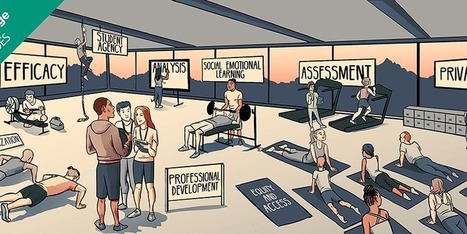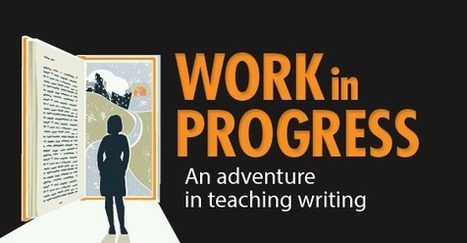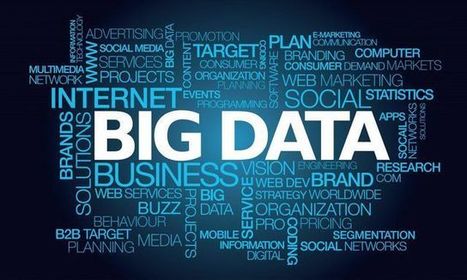 Your new post is loading...
 Your new post is loading...

|
Scooped by
John Evans
|
Google has now given us an option to set search and location data to automatically disappear after a certain time. We should all use it.

|
Scooped by
John Evans
|
“Data is at the heart of ensuring that every student has a learning experience that recognizes their individual needs.” (Paige Kowalski)
Data is being generated at exponential rates and there is no sign of slowing down. More data will be created faster than ever before! For example, Google now processes over 40,000 search queries every second on average, which translates into over 3.5 billion searches per day and 1.2 trillion searches per year worldwide, but these numbers will change every day and therefore make this blog irrelevant.
The focus of this blog is to help all educators, specifically novice teachers, understand the importance and significance of data in education. Most of the time teachers are focused on teaching content – making sure the students master the content of the material for a test rather than focusing on understanding the content and big ideas. Data helps teachers switch the focus from teaching content to teaching for understanding. When teachers are given tools through data, the student masters the content of the lesson in conjunction with the skills needed to recall and utilize the material in everyday life. According to Dr. John F. Pane, a senior scientist at the RAND Corporation, there are four reasons why data is crucial for personal learning in the classroom:
Imagine tapping into a raw data feed from a distributed network of IoT devices in a logistics center. The center is full of robots, employee work stations, and shipping and receiving docks. The data coming back contains important information about machine performance and operational efficiencies. Reading the data correctly will reveal important opportunities to increase productivity.
Via Kim Flintoff, NextLearning
If you think data—in education, or any field—is cut and dry, think again. Working with data in the classroom, especially, can be either exhausting or exhilarating—depending on your fitness level. Data can be big, but also quite small. It’s often quantitative, but is increasingly qualitative. It’s predictive, but not always inclusive. It’s private, but not always protected. But one thing’s for certain: data has enormous power to impact teaching and learning.

|
Scooped by
John Evans
|
For too long, the American education system failed too many kids, including far too many poor kids and kids of color, without enough public notice or accountability. To combat this, leaders of all political persuasions championed the use of testing to measure progress and drive better results. Measurement has become so common that in school districts from coast to coast you can now find calendars marked “Data Days,” when teachers are expected to spend time not on teaching, but on analyzing data like end-of-year and mid-year exams, interim assessments, science and social studies and teacher-created and computer-adaptive tests, surveys, attendance and behavior notes. It’s been this way for more than 30 years, and it’s time to try a different approach.
The big numbers are necessary, but the more they proliferate, the less value they add. Data-based answers lead to further data-based questions, testing, and analysis; and the psychology of leaders and policymakers means that the hunt for data gets in the way of actual learning. The drive for data responded to a real problem in education, but bad thinking about testing and data use has made the data cure worse than the disease.

|
Scooped by
John Evans
|
"Like many consumers, Ms. Magrin knew that apps could track people’s movements. But as smartphones have become ubiquitous and technology more accurate, an industry of snooping on people’s daily habits has spread and grown more intrusive."

|
Scooped by
John Evans
|
It's all about perspective.
Too often when we hear the word "data" we assume that the person speaking is talking solely about summative test results and the plethora of possibilities for learning we can take away from those numbers.
But this is NOT the only kind of data that exists, it is just the kind that gets the brunt of our ire and frustration as it is a solitary indicator of teaching and learning.
And that's what I struggle with. Test data is one single area for determining what kids know and can do and there are often many challenges with these standardized tests that skew the data on top of that.
However, most classroom teachers and leaders are gathering data like masterful musicians in their classrooms every day and just don't realize that is what they are doing.
|

|
Scooped by
John Evans
|
As college teams collect more and more data to improve performance, a player may be asked to swallow an electronic pill to monitor body temperature or wear goggles that track eye movement.

|
Scooped by
John Evans
|
For at least a decade now, the driving force behind education reform has been data. We talk about collecting data, analyzing data, and making data-driven decisions. All of this data can certainly be useful, helping us notice patterns we might not have seen without aggregating our numbers in some way, looking for gaps and dips and spikes, allowing us to figure out where we are strong and where we need help. In terms of certain academic behaviors, we can quantify student learning to some extent and improve our practice as a result.
And yet, we know this is not enough. We know our students bring with them so many other kinds of data. So many other factors contribute to academic success: the atmosphere in their homes, the demands of their out-of-school school schedule, the physical concerns that distract them, the passions and obsessions that consume them. These things are much harder to measure, so we don’t even try, focusing instead on the things we can convert to numbers.

|
Scooped by
John Evans
|
If you think data—in education, or any field—is cut and dry, think again. Working with data in the classroom, especially, can be either exhausting or exhilarating—depending on your fitness level. Data can be big, but also quite small. It’s often quantitative, but is increasingly qualitative. It’s predictive, but not always inclusive. It’s private, but not always protected. But one thing’s for certain: data has enormous power to impact teaching and learning.

|
Scooped by
John Evans
|
The amount of data we produce every day is truly mind-boggling. There are 2.5 quintillion bytes of data created each day at our current pace, but that pace is only accelerating with the growth of the Internet of Things (IoT). Over the last two years alone 90 percent of the data in the world was generated. This is worth re-reading! While it’s almost impossible to wrap your mind around these numbers, I gathered together some of my favorite stats to help illustrate some of the ways we create these colossal amounts of data every single day.

|
Scooped by
John Evans
|
The science of how technology affects happiness needs a huge statistical upgrade. A new paper charts a path toward better research.

|
Scooped by
John Evans
|
Spread the love
Edtech has changed the way the teaching and learning process works. Before this happened, if a teacher wanted to diagnose a child’s reading difficulties or tutor those on the brink of academic failure, they had to use human ingenuity to get things done. Or they had to manually calculate a mountain of data to gain some insight into the situation. But with the advent of learning analytics, all of that has changed.
Learning analytics are web-based measurements and reporting about student learning that is intended to help teachers improve the knowledge and skill acquisition of their students. This maximizes student learning potential while enhancing teaching and delivery methods. Though its application to education is relatively new, scientific disciplines have been using it for over forty years. Expansion into scholarship was birthed by advanced technology, and the data trails learners leave while using the internet. The data provides several benefits to aid educators and students.

|
Scooped by
John Evans
|
According to a recent Forbes article, data storytelling, which involves weaving data and visualizations into a compelling narrative, has become a sought-after skill in the job market. Today’s variety of online tools and resources offer an opportunity to prepare our students to interpret their research in new and creative ways and to effectively communicate data-driven insights.
|
 Your new post is loading...
Your new post is loading...
 Your new post is loading...
Your new post is loading...























